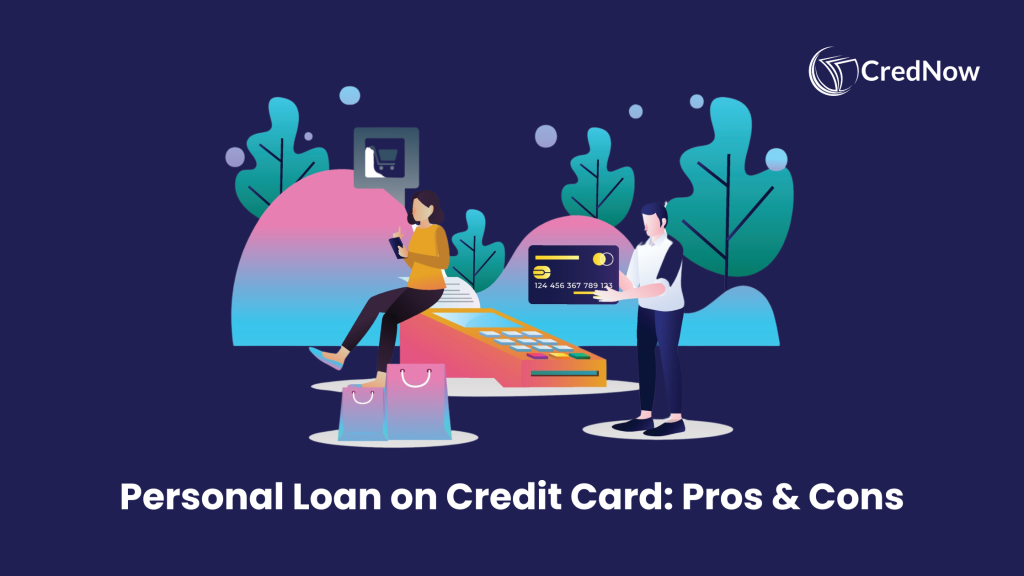In today’s fast-paced world, financial flexibility is a crucial asset. Professionals often find themselves in need of quick access to funds, whether for personal emergencies, consolidating debt, or seizing investment opportunities. One popular financial tool that offers such flexibility is the personal loan on a credit card. While this option can be highly beneficial, it also carries certain risks. This article aims to provide a balanced overview of both the advantages and potential pitfalls of taking a personal loan on a credit card.
Understanding Personal Loans on Credit Cards
Before delving into the benefits and risks, it is essential to understand what a personal loan on a credit card entails. Essentially, this type of loan allows you to borrow a lump sum of money against your credit card limit. The borrowed amount is then repaid over a set period, usually with a fixed interest rate. This differs from regular credit card use, where you make purchases and pay them off either in full each month or over time with variable interest rates.
Benefits of Personal Loans on Credit Cards
1. Quick Access to Funds
One of the most significant advantages of taking a personal loan on a credit card is the speed at which you can access the funds. Traditional personal loans from banks or NBFCs often require lengthy application processes and extensive paperwork. In contrast, a personal loan on a credit card can be approved and disbursed relatively quickly, making it an ideal solution for urgent financial needs.
2. Fixed Interest Rates
Unlike regular credit card purchases that accrue variable interest rates, personal loans on credit cards typically come with fixed interest rates. This means that the interest rate remains constant throughout the repayment period, allowing you to plan your finances more effectively. You can budget for consistent monthly payments without worrying about fluctuating interest rates.
3. Consolidation of Debt
For professionals juggling multiple debts, consolidating them into a single personal loan on a credit card can simplify financial management. By merging various high-interest debts into one loan with a potentially lower interest rate, you can reduce your overall interest burden and streamline your repayment process.
4. Flexible Repayment Terms
Credit card companies often offer flexible repayment terms for personal loans, ranging from a few months to several years. This flexibility allows you to choose a repayment period that aligns with your financial situation and goals. Whether you prefer shorter terms with higher monthly payments or longer terms with lower payments, you can find an option that suits your needs.
5. No Collateral Required
Personal loans on credit cards are typically unsecured, meaning you do not need to provide any collateral to secure the loan. This can be particularly advantageous for professionals who do not want to risk valuable assets, such as property or investments, to obtain financing.
Risks of Personal Loans on Credit Cards
1. High-Interest Rates
While some personal loans on credit cards offer competitive interest rates, others can be relatively high, especially if you have a lower credit score. It is essential to carefully compare the interest rates offered by different credit card companies and consider whether you can afford the cost of borrowing.
2. Impact on Credit Score
Taking a personal loan on a credit card can impact your credit score in several ways. Firstly, applying for the loan may result in a hard inquiry on your credit report, which can temporarily lower your score. Additionally, if you use a significant portion of your credit limit, it can increase your credit utilization ratio, potentially harming your credit score.
3. Debt Accumulation
While consolidating debt can be beneficial, it also carries the risk of accumulating more debt if not managed responsibly. If you continue to use your credit card for new purchases without paying off the existing loan, you could find yourself in a cycle of increasing debt. It is crucial to have a disciplined approach to borrowing and repayment to avoid this pitfall.
4. Fees and Charges
Personal loans on credit cards often come with various fees and charges, such as processing fees, late payment fees, and prepayment penalties. These additional costs can add up and increase the overall expense of the loan. Make sure to read the fine print and understand all associated fees before committing to a loan.
5. Limited Loan Amounts
The amount you can borrow through a personal loan on a credit card is typically limited by your credit card limit. If you require a larger sum of money, you may need to explore other financing options. Additionally, maxing out your credit card limit can leave you with little available credit for emergencies or other needs.
Must Read: 5 Steps to Personal Loan Success
Conclusion
Taking a personal loan on a credit card can offer a convenient and flexible way to access funds quickly, manage debt, and benefit from fixed interest rates. However, it is essential to be aware of the potential risks, including high-interest rates, impact on credit score, debt accumulation, fees, and limited loan amounts. By carefully considering your financial situation, comparing loan options, and adopting responsible borrowing practices, you can make an informed decision that best suits your needs.
In the dynamic landscape of professional life, financial tools like personal loans on credit cards can provide valuable support when used wisely. Whether you are dealing with unexpected expenses, consolidating debt, or planning a significant purchase, understanding the benefits and risks can help you navigate your financial journey with confidence and ease.

Frequently Asked Questions (FAQs)
1. What is a personal loan on a credit card?
A personal loan on a credit card allows you to borrow a lump sum of money against your credit card limit. You repay this loan over a set period with a fixed interest rate, different from the variable interest rates associated with regular credit card purchases.
2. How quickly can I access funds through a personal loan on a credit card?
Funds from a personal loan on a credit card can be accessed relatively quickly compared to traditional personal loans. The approval and disbursement process is typically faster, making it a suitable option for urgent financial needs.
3. Are the interest rates for personal loans on credit cards fixed or variable?
Personal loans on credit cards usually come with fixed interest rates, meaning the interest rate remains constant throughout the repayment period. This allows for more predictable and manageable monthly payments.
4. Can I use a personal loan on a credit card to consolidate debt?
Yes, you can use a personal loan on a credit card to consolidate multiple high-interest debts into one loan. This can simplify your repayment process and potentially lower your overall interest costs.
5. Do I need to provide collateral for a personal loan on a credit card?
No, personal loans on credit cards are typically unsecured, meaning you do not need to provide collateral to secure the loan. This reduces the risk of losing valuable assets.



